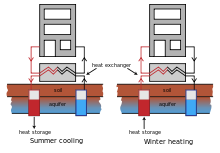
A ground source heat pump (also geothermal heat pump) is a heating/cooling system for buildings that use a type of heat pump to transfer heat to or from the ground, taking advantage of the relative constancy of temperatures of the earth through the seasons. Ground-source heat pumps (GSHPs) – or geothermal heat pumps (GHP), as they are commonly termed in North America – are among the most energy-efficient technologies for providing HVAC and water heating, using far less energy than can be achieved by burning a fuel in a boiler/furnace or by use of resistive electric heaters.
Efficiency is given as a coefficient of performance (CoP) which is typically in the range 3 – 6, meaning that the devices provide 3 – 6 units of heat for each unit of electricity used. Setup costs are higher than for other heating systems, due to the requirement to install ground loops over large areas or to drill bore holes, and for this reason, ground source is often suitable when new blocks of flats are built.[1] Otherwise air-source heat pumps are often used instead.